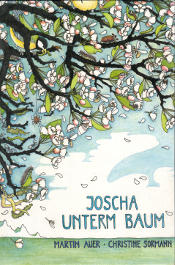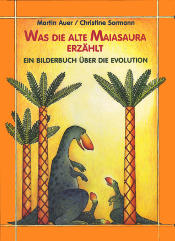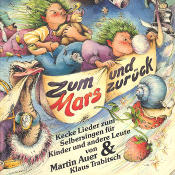Martin Auer: The Strange War, Stories for Peace Education

Foreword
Please share if you want to help to promote peace!
Translated by Kim Martin Metzger
Reviewed by Martin Auer
Bücher und CDs von Martin Auer

In meinem Haus in meinem Kopf
Gedichte für Kinder

Die Prinzessin mit dem Bart
 Joscha unterm Baum
Joscha unterm Baum

Was die alte Maiasaura erzählt

Die Erbsenprinzessin

Der wunderbare Zauberer von Oz - Hörbuch zum Download

Die Jagd nach dem Zauberstab, Roman für Kinder - Hörbuch zum Download
 Der seltsame Krieg
Der seltsame KriegGeschichten über Krieg und Frieden

Zum Mars und zurück - Lieder
 Lieblich klingt der Gartenschlauch - Lieder
Lieblich klingt der Gartenschlauch - Lieder

Lieschen Radieschen und andere komische Geschichten - CD
Ever since I started writing books for children, I have considered it important to deal with the difficult subject of war and peace in a way that children can understand. It seems to me that it is not enough to tell children that war is terrible and that peace is much nicer. Although even that is a step forward, of course, considering there was once a youth literature that glorified the military and combat action. But most children in our latitudes know that war is something terrible and peace is much nicer. But is peace possible? Or is war an unavoidable destiny that keeps befalling humankind? Doesn’t our history class, as well as the evening news, teach us that war has always existed everywhere in the world and is still with us? A culture of peace, understanding of others, peaceful resolution of conflicts – all of that is well and good: but what if the others do not want to go along?
I cannot imagine how we can banish war from the life of humankind, if we do not search for the causes of war. Only when the cause of a disease is discovered, can a focused and effective method be found to fight it.
It is true that I just skipped all my history classes at university, but at home I have continued my studies of history for myself to this day because, as a writer, the question of what determines people’s actions and thoughts is naturally always on my mind. But of course I cannot claim to have found the philosopher’s stone or that in my stories I could absolutely explain the causes of war. And I also cannot present a complete recipe for the avoidance of future wars. But I want the stories to do more than just give people "food for thought." Writers are always trying to give people something to think about, but at some point, someone is going to have to start thinking. The stories I have collected here are intended to suggest a direction in which a person can continue to think; they are intended to convey a feeling for where and how to search for the causes of war.
Maybe the intentions of the book can best be summed up like this: I try to show how our actions can be interconnected in such a way, that the ones who do not try their best to further their own interests must perish. But that on the other hand by each of us trying to further our own interests we may in fact unintentionally increase the loss or make worse the damage for all of us. And that we cannot escape this dilemma unless we communicate with each other and coordinate our actions. This moral is simple enough, but the hard thing is to really see through the complex ways in which the actions of individuals, groups, nations, states on this planet are interconnected.
I am trying to teach children to begin to recognize that sort of social mechanism, and I think that this is a novel approach in children's literature.
The Dreamer took shape during a weeklong workshop, arranged by the cultural initiative "Fireworks" in the Oetz valley, Tyrol. The theme was "Free as the Wind and the Clouds." There the children and I wrote a "Wind and Cloud Book."
I wrote The Blue Boy for the children’s television series "Siebenstein" presented by the German television network, ZDF. I wrote it shortly after the wall came down between East and West Germany in 1989, when the whole world was seized by a short-lived euphoria of peace. When the story appeared in a book, we had already experienced the Gulf War. This story is about the hardening of the soul that can produce fear. The point of the story is not that the boy throws away his gun in the end but rather why he throws it away. "Well, you could just throw away your gun," is not enough. First there has to be hope for change.
The Planet of Carrots shows how a specific social system can develop its own dynamic, so that it becomes very difficult to change anything in the system, and even those who are actually placed at a disadvantage by the system can become its defenders.
Fear is an example of how we often do not use our reasoning power to find out how things really are, but use it only to justify our desires or urges, our fear or our hatred. The human being's ability to deceive itself is one of its most amazing qualities. In class you may want to find more examples with your students.
The same paraonoid logic that is demonstrated in Fear is depicted in Fear Again, this time on the level of the state.
The Strange People from the Planet Hortus is quite simply about the costs of waging war.
When the Soldiers Came shows in a condensed form, which can already be understood by quite small children, that conquest and exploitation are the essence of war, not difference of opinion or race or culture or conflicting interests. It argues that an egalitarian society has no need for conquest whereas a hierarchical society cannot exist without conquest. The theme is expanded in Report to the United Solar System's Council.
The Great War on Mars is an attempt to show how
the fact that everybody pursues his or her own – actually harmless and even justifiable - self-interests
can lead to results that nobody intended.
When I tell the story I usually make a break after: "Maybe we should have given our field marshal the pink slip!" said the Moffers. I say: "Well, here the story must end, mustn't it? What else can happen now but wheeeee - WHAM!" I let it sink in for a few seconds, then I take up the story again and tell the happy ending, making it clear that this is not very likely to happen in real life.
We often have very interesting discussions when I ask the children who was responsible for the whole desaster. Whoever they name, I defend them and show that they had good reasons for acting - or not acting - the way they did. I ask them: What difference would it make if one of the peasants refused to sell his potatoes to the army? Someone else would be able to sell even more potatoes and the peaceloving peasant might starve with his family. So if he can't make a difference, isn't he right to do what is best for his family? So what can be the solution?
The theme is expanded in At Your Own Doorstep.
The Sun and the Moon was first published in the magazine "Parenting" in India. It illustrates two points. The first one is, how religion will often be used to justify aggression, when really material motives lie at the core of the conflict. There will always be bigots like Mrs. Pema or Mr. Tashi. But the crucial question is: Under what circumstances will they be able to gather a following, under what circumstances will political leaders like Mr. Dorji take up the cause of religion? The second point is of course that conflicts about resources can usually be resolved in more than one way and possibly a peaceful solution can be found. When discussing the story it should be compared to "When the Soldiers Came". What is the difference between the conflict between King Ubuk and King Babak on the one hand and the conflict between the villages of Tralang and Namkha on the other?
The Slave is about how it can happen that people create systems of which they themselves become prisoners. You might want to ask you students why the slave only can think in terms of master and slave.
I wrote The Farmers Who Were Good at Numbers after reading The Logic of Collective Action by the economist Mancur Olson. In this book, the author reliably demonstrates that it is theoretically impossible for a large group of individuals acting rationally in their own self-interests (this is the favorite model of modern economics) to do something together for a common cause, even if everyone knows that it would be better for all if everyone committed themselves to this cause. He also shows why it is easier for smaller, more manageable groups to do something for a common cause than it is for really large groups.
The Strange War shows a possible form of passive resistance. What kind of resistance is possible depends, of course, on the goals of the aggressors. If the aggressors are intent on wiping out the other nation, this form of resistance will not be possible. But most wars are waged to subjugate people, not to exterminate them.
Arobanai is an account of the life of BaMbuti ("pygmies ") in the tropical forests of Congo as
an example of the life style of hunters and gatherers. It is based on the research
conducted by Colin Turnbull. All known hunter gatherer societies are egalitarian, with very weak leaders or none at all. They do not wage war because conquering more land would not make sense for them, as they would not be able to use it. They may fight with a neighboring group for such resources as a tree rich in honey or some such delicacy.
That they do not wage war does not mean that they are not violent. The ethologist Irenäus Eibl-Eibesfeldt pointed out that the Khoi ("Bushman") people of the Khalahari desert, although they do not wage war, have an extremely high murder rate. But this only supports the theory that the cause of war is not the violent nature of the individual but the structure of the society.
Star Snake, is the story of a young Aztec warrior and the history of the rise of the Aztec Empire.
The two stories Arobanai and Star Snake contrast one of the most peaceful and loving societies that has ever lived on this planet with one of the cruelest and most warlike. They ought to be read together. The task for the students should be to carefully compare the structure of the two societies and the various aspects of life. What is the economic basis of each society? How are the goods distributed? How is labour divided among the members of society? How are decisions made? What sort of ethics prevail? How are the children and young people educated? What are the ideals they are taught? And finally: How is it possible for beings of the same species to be so different in their feelings, thoughts, and in their actions?
At your Own Doorstep was originally inspired by the traffic situation in Beirut. But of course road traffic serves here as an example of a special case of societal entanglements. If you enter the words "Peace begins" in any Internet search engine you will be amazed how many pages you get of the form "Peace begins at your own doorstep", "Peace begins within your soul" and so on. But what is the next step?
The philosopher Sir Karl Popper warned of revolutionary change. He advocated "piecemeal social engineering", small changes which by and by will lead to a better society. He argued that social experiments on a smaller scale could not cause so much damage and could more easily be reversed if they were not successful. There is much to what he said, but in my opinion he overlooked one thing: social systems tend to settle in a relatively stable equilibirium. If you put a little ball on the bottom of a round bowl and you push it a little, it will move a little towards the edge of the bowl and them roll back. If you push it a little harder it will climb up a little higher towards the edge and then roll back again. You need a certain minimum of force to push it over the edge of the bowl. Anything less will just not make a difference.
Take the example of a city council that wants to improve a "bad area" of the town. The streets there are strewn with litter, so the city council decides to put up litter bins. But to no avail. Almost nobody uses them.
Why is that?
In the "nice area" of the town, if you throw away a banany peel on the sidewalk a person who sees you doing it will approach you and ask you to use a litter box, or they may even pick up the banana peel and put it in a litter bin. In a "nice" area one banana peel on the sidewalk makes a big difference. And everybody living in a "nice" area wants it to remain nice.
In the "bad" area of town one banana peel more on the sidewalk does not make a difference at all. And putting your banana peel in the litter bin does not make a difference either. So why take the trouble? If you want people to use the litter bins at least you must remove all the litter from the streets first, so that putting your banana peel in the litter bin will make a difference. Probably you will also have to educate the people because they have been used to throwing away their litter in the streets. They will have to reach some sort of agreement that clean streets are good for their health. Or - because the "bad" area of the town is probably the poor area - they may have more pressing problems on their hands than litter.
So even if you want to adopt the piecemeal approach for social change you must find out what is the minimum effort necessary to overcome the stable equilibrium of a certain situation.
The bad news is that situations where people work together for a common good are usually less stable than situations where everyone fends for themselves. One careless litterer will not upset the equilibrium of the "nice" street. But if, let's say, 10% or 20% of the inhabitants get careless and throw their litter on the street, the rest of the population may soon give up and get careless too. On the other hand, if 10% or 20% of the inhabitants of the dirty street start using the litter bins they still will not make a visible impact and will not be able to change it into a clean street if they do not proactively try to convince their neighbors.
The Two Prisoners introduces something known in game theory as the "prisoners dilemma." It is a classic model for how the quite rational pursuit of an advantage for oneself can nevertheless become harmful to all concerned. As long as one adheres to the conditions of the model that the two prisoners cannot communicate, there is no solution.
Justice I wrote for a congress on children's books in Israel in 2001."Justice" is a very ambiguous concept and it is often abused. What is a just distribution of goods? Give to everybody what he or she deserves? Or give to everybody enough for a decent life? How do you decide what someone deserves? And who decides?
And if someone commits a crime, what is a just punishment? An eye for an eye? Should a murderer be killed? Should a rapist be raped? And what about mass murderers? You can only kill a person once. For the murderers of my grandparents, who were killed in the holocaust, their could never be a "just" punishment. And for my father, who survived, their could never be a "just" compensation. My father never sought justice or revenge. His goal in life was to understand what happened, how it could have happened and how something similar could be prevented in the future.
The Bewitched Islands: What causes a king to be king? Some quality he was born with? Some skills he has learned? No, only the fact that people accept him as their king. What causes money to be money? Some quality of the material it is made of? The numbers and letters that are stamped on it? No, only the fact that people accept it as money. Many words that seem to denote a certain thing actually denote a certain human behavior. The sentence: "This pair of shoes costs 20 dollars" seems to describe a quality of the shoes. But this is not so: Someone demands 20 dollars, someone pays 20 dollars. The price is not a quality of the shoes but a certain human behavior. A "price" or a "law" or a "country" is something that exists only because of the rules of the game, just like a "trump" or a "straight flush". Will a straight flush always beat a full house? Yes, as long as we are playing poker. If we decide to play bridge instead, words like "straight flush" completely lose their meaning, even if we are still holding the same deck of cards in our hands.
Money is about economic conquest. Events such as the one described happened many times in the history of colonialism. The story also tries to explain the most puzzling aspect of money: Why can you get something for it? All earlier forms of money are relatively easy to understand: People were willing to exchange useful things for money because the things that were used as money were also useful. Cocoa beans, cowrie shells, camels, copper, silver or gold: you knew you could exchange these things for almost anything else because these things were useful themselves. You could eat them or milk them or ride them or turn them into tools or jewellery. Anything that many people want to have can serve as money, as a means of exchange. Nowadays people accept worthless paper money (No, the bank does not guarantee to give you gold for it. That was a long time ago), because they need the government's money to pay their taxes to the government. That's the simple secret.
In the War shows that war has many sides that may appeal to boys and men and even girls and women. If it were not so, it would be much harder to make the men (and boys and girls and women) march into battle.
The Story of a Good King I wrote in Korea in 2010. I attended a meeting of writers and illustrators from all over the world. They all had contributed to a collection of peace stories and had come together to celebrate the publication of the book. There was much talk about the power of love and the importance of tolerance and friendship. "When people sing and dance together they will not fight each other later on", was a statement that got much applause. I did not like to contradict this statement but I had to because it simply is not true. How often in history has it happened that people who had been good friends and neighbours suddenly found themselves on different sides of the front-lines! Although tolerance, friendship and love are indispensable values they are not enough. We must also teach our children critical thinking and an analytical world view. We must help them to see through political propaganda and peace rhetoric. And most important we must understand and help our children to understand that large groups of people behave differently from single persons. States don't start to fight because they don't like each other. You cannot use psychology to explain the behaviour of states or tribes or companies or religious communities because such organisations are composed of many individuals with different psychologies, different world views, different interests and a very limited knowledge of what the other members of the group are up to. The behaviour of the group is determined by the behaviour of all its members, but the outcome may be completely different from anything any single member of the group has been trying to achieve. As an example I wrote this story.
Report to the Council of the United Solar Systems sums up all of the themes, and maybe it is what the blue boy discovered during the years he studied the blue planet, while gazing through the telescope.
Yer is Turkish and means Earth. Nin is Jpanese and means person. Wojna is Polish and means of course war.
It was at the same workshop in the Oetz valley that I wrote the first drafts of this story. The children were encouraged to ask me for stories, and one girl, who coincidentally shares my last name and whose first name is Nina, brought me a note that said, "Martin, please tell me why there are wars." The story is based, among other things, on the research of Lewis Mumford (The Myth of the Machine), but naturally also on my own reflections.
I used to think that there had been a time when humankind did not know war. When I read Jane Goodall’s account of a war between chimpanzees, I had to revise this opinion. Even in the age of the hunters and gatherers it was possible that one band had to find new hunting grounds and in the process got into a conflict with another band. But after the other band had been driven away, the war was over. Wars could happen, but they were not a critical component of the culture. It was not until the advent of agriculture, with plant cultivation and domesticated livestock, that people were able to store supplies and so even had time for military campaigns. As for the vanquished, these supplies were something that could be stolen without necessarily destroying those who had been robbed. War became a permanent institution because it was a means to gather together the surpluses of smaller groups of people and to invest them in strategies that resulted in an increase in productivity, i.e., in the production of even more surpluses that again could be invested in progress. And this was a far more effective means of subsistence than negotiations or free confederations would have been. The motivations of the individuals in power or of the warriors were less important. In nature, characteristics like horns, for example, arise by means of chance mutations. Whether the horns remain or disappear depends on whether they give their bearer a reproductive advantage or are a hindrance. A tribal chief might start a war out of hatred of his neighbor, for reasons of prestige, for religious reasons, because of pure arrogance, because of built-up aggression, because of sexual frustration, whatever. But war is able to persist as a permanent institution because of several factors: first, it promotes the congregation of people in large empires, and thus it makes gathering surpluses possible. Secondly, because it takes away more surpluses from a large portion of these people than they would be willing to invest in the common cause or in the future. And finally war persists because it promotes "progress" in the form of increased productivity of human labor. An advantage to society does not, however, have to be an advantage to the individual. A community of 500 free farming families would have been happier than an army of 100,000 farming families under the rule of a warrior chief. But only the empire of a warrior chief could afford a capital city with temples and schools for priests where the movements of the stars are studied.
The aggression that humans are capable of is certainly a precondition for wars being waged in the first place, but it is not the cause. Were the young men in Austria-Hungary more aggressive in 1914 than say in 1880? Or did the Kaiser become more aggressive in his later years? Often people’s aggressiveness and hatred of their neighbors must be stirred up in order for them to be ready to go to war or let their children go. Often though, the aggressiveness of soldiers has to be curbed. Whereas, on the one hand, some humans are trained for special units to be fiends, as for example the Green Berets in Vietnam, a modern army needs foremost people who are disciplined and who function reliably; that is, people who let themselves be governed by emotions as little as possible. The human being’s capacity for coolly objective and dispassionate action is, perhaps, even more dangerous than his capacity for aggression. As important as are all the pedagogical efforts that serve to reduce aggression, promote understanding of foreign cultures, teach the ability to solve personal conflicts peacefully, none of these measures can eliminate the causes of war. The industrial market economy that today controls the social structure on our planet is concerned (as no previous social structure has been) with increasing productivity, with producing ever more goods requiring ever less work, and investing the surpluses immediately in increased production and productivity. This not only leads to the fact that we will soon be reaching the limit of what the planet can stand ecologically. Here also lies the root of new wars. It is said that the wars of the future could be fought over ever decreasing resources, e.g., water. That is conceivable. But it is just as conceivable that future wars will be waged between the giant multi-national economic conglomerations, and that they will be about who may sell what to whom.
The important difference is this: A conflict about resources can be resolved. Let us say, the conflict is about water. Such a conflict can be resolved in different ways: One of the competing parties may conquer the resource for themselves and leave the others to starve or to flee. Or they may destroy the other party more or less completely by direct violence. Or the war reduces the population on both sides until the combined population is small enough for the existing water supply. But the conflict can also be resolved if new sources of water can be found, for instance by digging deeper wells, by desalinating sea water; or by inventing methods to save water and reduce its consumption. Conflicts about resources can be the cause of the most terrible, most cruel wars, even of genocide. But conflicts about resources are finite. And it is always possible to at least think of a peaceful way to resolve a conflict about resources. Whereas the war that is caused by the necessity - not the wish, the necessity - to expand the empire, to acquire new markets, to concentrate more surplus, is inherent in the structure of exploitative societies and is infinite.
To avoid future wars, six billion – and soon it will be seven and eight billion – people will have to agree on new economies and social structures. Only when they know something about one another and act with each other in mind, can people avoid increasing the harm to all by seeking only their own advantage. No longer can the goal be to constantly raise productivity – to produce ever more goods with ever less work; the exchange of things should not be the main content of interpersonal affairs. The fact that things can be produced with less and less labor should not lead to ever more things being produced. Instead it should lead to people being able to use the freed-up time to exchange social services with each other: art, entertainment, care giving, healing, education, research, sports, philosophy …
